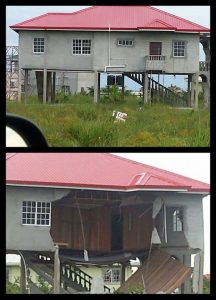….homeowners urge greater monitoring of contractors
MORE than seven years after the initiative, entitled ‘National Building Codes’(NBC), was launched, buildings, particularly in the Housing Sector, continue to be erected with little or no supervision from the authorities.
The initiative, often referred to as the code,is expected to guide architects and contractors on the design and construction of buildings. As such it focuses on fire safety, use and occupancy, electrical, plumbing, use of Guyanese hardwoods in construction, concrete and block masonry, structural steel, high-rise buildings, foundations and excavations, and design and construction of septic tanks and associated secondary treatment and disposal systems.
But from all indication, the National Building Code is not in full effect. Contractors building residential homes, for the most part, are unregulated. Such deficiency exists at a time when Guyana continues to experience an increasing demand for housing with the Central Housing and Planning Authority (CHPA) currently tackling a backlog of over 25,000 applications for house lots. For many there is no greater feeling than owning their own home.

“It’s a really nice feeling of accomplishment and going there from day one when you were looking at just mud on the ground and now you have a whole building there, you feel so accomplished, you feel like I’ve done this,” testifies Wasim Khan, who built his home between 2015 and 2016.
Though he has a success story to tell, Khan said he is all too aware of the many horror stories told by home-owners whose buildings were poorly constructed.
Khan’s contractor was a family member who was recommended to him. “I didn’t feel like I needed a contract, but looking back it’s risky. With how the industry is going I think a contract is something important because I’ve heard 101 horror stories about contractors and persons who had to change contractors,” Khan told Guyana Chronicle.
Noting that the Housing Sector should be monitored, Khan suggested that contractors should be registered under a single authority.
Marketing of contractors, in Guyana, happens largely by word of mouth, with consumers rarely using contracts, or questioning the contractors’ qualifications. Some consumers pay the price when they are left with shoddy work.
Many complainants end up at the Consumer and Competitions Affairs Commission (CCAC), hopeful for some redress for the poor work done by contractors.
As a result of increasing complaints, the CCAC in 2018 launched a ‘Homebuilders Roadmap,’ marking the start of the compilation of a document that would answer many questions, and direct home builders as they pursue their dream of building their home. The roadmap is almost completed.
“We are about three-quarter way completion, so we’re expecting that to be finished at least by the end of the year. We’re hoping to have a physical copy and a virtual online copy. When the groundwork is completed, we do hope to have it online. We want to create this interactive website so people can go there, and have access to all the steps when they’re building their home. If not this year then early next year we hope to launch it online,” explains Consumer Affairs Officer, Feyona Austin-Paul.
The roadmap will cover six phases, walking the consumer through from land acquisition all the way to construction. “We have had complaints from persons, who built, not only homes, but just did some sort of construction, and it is some sort of shoddy construction and we realise that consumers don’t have all the knowledge,” Austin-Paul told this newspaper.

Photo saved as Feyona Austin-Paul
“We realise that this is something that is lacking in Guyana, and we realise a lot of times when people hire these contractors, the contractors are not recognised. They’re just somebody who was recommended by somebody, and that person is not qualified in the area and you have a whole lot of complaints with the work not being done appropriately,” she added.
CCAC is mandated to protect consumers’ interest in accordance with the Consumer Affairs Act of 2011. The roadmap hopes to eliminate problems consumers encounter in the process, which in some cases can be considered extremely dangerous or life threatening.
Nonetheless, even when it goes into existence, the roadmap will not address all of the challenges being experienced in the Housing Sector. It will not address Guyana’s lack of an effective licensing or monitoring system for contractors and other service providers.
This deficiency, however, is not so much about the need for more policies but rather the need for more enforcement.
Though launched in 2012 by the Guyana National Bureau of Standards (GNBS), the code is not being enforced.
“There is no agency monitoring the building codes. They are currently just voluntary, some contractors and builders follow the requirements, but they are not obligated to because there is currently no agency monitoring them. But it is good if they follow the codes and do what is required to improve their activities, or outcome of the construction,” GNBS Public Relations Officer, Lloyd David explained.
According to David, the Bureau establishes standards but is not responsible for the monitoring of buildings during their construction phase. The “National Building Codes” speak to the creation of a “National Building Code Committee” and a “Sub-committee – Enforcement” but there are no such committees in place.
“The Bureau realises that there is a gap there because there is great need for some institution or agency to monitor the codes. Enforcement, registration, licensing all of that is addressed in the building code but there is still need for that authority to be established to monitor all of that,” David said.
He said the establishment of a monitoring agency would require directive from the subject minister. GNBS falls under the Ministry of Business, headed by Minister of Business Haimraj Rajkumar.
The code was established to “provide an efficient and effective system for granting building permits, administering building matters and resolving building disputes”, as well as to “facilitate uniformity in the education, training and qualifications of building practitioners and the recognition of qualification.”
For Althea Thegg, if such a system, as outlined in the NBC, was in effect she probably would have been spared the horrifying experience of witnessing her home collapse.
A young professional, Thegg was filled with joy at the thought of one day owning her own home, and began to see that dream take shape in 2017 when she began construction in Phase Two, Farm Housing Scheme, East Bank Demerara.
But her story had no happy ending; Thegg became widespread news when she posted pictures on her social media page of her home crumbling to pieces. At the time, it was more than 90 per cent completed.
Watching her home and ultimately her dream crumble, Thegg compared the feeling to that of losing a loved one.
“I think I met my lowest point on that day. It was like the way how I felt when I lost my mother that is how I felt like everything was over for me, done with, this was the end.
Knowing that you worked so hard, you have reached so far, you have achieved something, you were about to move into this home and it just all went away in the blink of an eye, but God is the one has me standing here, I didn’t run mad and I thank him,” Thegg testified.
Thegg is currently still wrapped up in legal proceedings in her attempt to get compensation from the contractor. She was forced to tear down the entire property, and today the land remains empty even as Thegg continues to pay her mortgage.
She still hopes, as she did in 2017, that her story could effect a change in the system, and other home builders could be spared the nightmare she endured.
“We need systems in place that would prevent these crookish contractors out there from getting jobs and destroying people’s lives,” she said.
“I think all contractors, especially those who are doing residential buildings should be certified or licensed and if he or she does not have a license to build the commercial banks, who are lending these monies, they also should get involved, they should say to the customer if the contractor does not have a license we cannot issue this loan,” Thegg opined.




.png)









